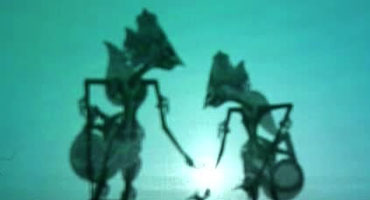
 Saya setuju
Saya setuju
.
Kalimataya (2010)
Sutradara: Nanang Hape
Cara penulisan kutipan: Nanang Hape ([2010] 2016), Kalimataya [Kalimataya], translation and notes by Miguel Escobar Varela and Egbert Witts. Singapore: Contemporary Wayang Archive. Retrieved from http://cwa-web.org/en/Kalimataya.
Ringkasan (Bahasa Inggris)
As the Baratayuda draws to a close, Aswatama sneaks into the Pandawa camp and kills several of their fighters. Several years later, Parikesit - the Pandawa heir to the Astina throne, talks to Kresna and questions the character and decisions of his ancestors.
Sumber lakon: Mahabharata
Iringan: Gamelan, Gaya Tersendiri
Artistik: Lampu Berwarna, Kelir Wayang, Panggung Teater
Pemain: Dalang Tunggal, Penari
Jenis wayang: Wayang Tradisi
Bahasa: Bahasa Indonesia
Catatan Teknik (Bahasa Inggris)
Catatan: This is an example of Wayang Sandosa [Wayang In Indonesian]. Although this performance was first conceived in 2004, the version in the archive corresponds to a recording made on 31 January 2010.
Diproduksi oleh: Studio Setupaing, Kayon Miring
Direkam di: Gedung Pewayangan Kautaman, Jakarta
Pemeran dan kru
Script: Nanang Hape
Movement direction: Bambang Asmoro
Wayang animation: Bambang Asmoro, Sambowo Agus H, Kiki Dunung, Sri Rahayu Setyawati, Irwan Riyadi, Dwi Adi Nugroho, Bimo Sinung W, Nanang Hape
Musicians: Sri Eko Widodo, Tendri Yusuf, Tri Wahyoe Widodo, Sruti Respati, Angger Widhi, Bagyant Siswoyo, Wawan Riaynto, Anton Satrianto, Sutikwan
Voice actors: Meyke Vierna, Didi Hasyim, Harris Syaus, Hari Prasetyo, Ayat Muhammad, Adi Nugraha, AGS Arya Dipayana
Dancers: Tri Harjanto, Dwi Nurul Hidayah
Documentation: Yanusa Nugroho, Helmi Budi Prasetyo
Gamelan: Sanggar Redi Waluyo
Technicians: Sukiman, Solimin, Santo Glenn, Andi, Mbah Harno Astrada, Surono, Sugeng
Production director: Ekotjipto SH
Penanggung manager: Y. Sudarko Prawiroyudo
Executive producer: Ir. Retno Irawati, Prapto Panuju
Administration: Sumari, S. Sn.
Patrons: Ibu S. Surono, Ibu Soepardjo Rustam, Ibu Soedjarwo, Bapak Drs. H. Solichin
Organizers: Sena Wanti, Pepadi PUSAT, Gendung Pewayangan Kautaman
Melihat metadata untuk file ini.
Translation and notes by Miguel Escobar Varela (MEV) and Egbert Witts (EW).
1. Poetic language. After the light has passed through the gem, the light changes color EW.
2. Poetic language. Bergelut [to hold on to something] and disimpan[to keep something safe] refer to the gaze of the King EW.
3. Poetic language. The honey probably refers either to the soul that was given away, or the beauty that was just an illusion of love EW.
4. Poetic language. This probably means life is short EW.
5. Poetic language. Punahkan [to extinguish] MEV.
6. Kurusetra is the battle ground where the Baratayuda war took place MEV.
7. Arjuna is referring to Destarastra, the blind father of the Korawa MEV.
8. Tawa buk [laughing with hiccups] EW.
9. Tumaritis is a mythological place where people of all walks of life can live together harmoniously. Besides this, humans can live there together with other beings without bothering each other EW.
10. Amarah [anger] is characterized as a group of birds that fight each other for the right to make a nest. This probably refers to the animosity that lingers in the descendants of the Pandawa and the Korawa MEV.
11. Kresna uses memadamkan [extinguishing a fire], because he uses the word pelita [leader], which also means light EW.
12. Kresna literally says "you will become a second Duryudana" EW.
13. Bedebah is a curse word. Mata keranjang [basket eyes] is a slang term for womanizer EW.
14. The story of Utari and Abimanyu is narrated in Sumpah Pralaya, also in this archive MEV.
15. Betawi language is used for comic effect EW.
16. The Javanese Gegares and the Sundanese Ngalebok are both slang terms for eating EW.
17. Slang terms. Pale [head], Peyang [strange head] are derogative terms. Comberan [gutter] is Jakartan slang EW.
18. Bhineka tunggal ika[unity in diversity] is the national motto of Indonesia. EW.
19. Kéré [poor] is a Javanese term, used as slang in Indonesian. In this case it means having poor ideas EW.
20. A famous wayang performance venue at the entrance of the Taman Mini Indonesia Indah (TMII) complex in Jakarta. At TMII, visitors can see the whole of Indonesia in one amusement park EW.
21. Tegas tegas [resolute] is actually addressed at the other punokawan, making clear to them that one should act with more confidence when talking to a lady EW.
22. Lé[son] is an informal term of address (see honorifics tab in this window), which Gareng uses accidentally MEV.
23. Buděg [deaf], Javanese word MEV.
24. Verboden [forbidden], Dutch word. It is still often used by older generation Indonesians EW.
25. Indonesian expression that means taking advantage of a situation EW.
26. Sexual joke, referring to Semar's old age EW.
27. See notes 1 to 5 MEV.
28. In the Hindu tradition upon which the epic is based, each directions of the wind is associated with certain gods and skills EW.
The honorifics in the original languages were retained in the subtitles. In Javanese and Indonesian, speakers address their interlocutors with over 40 different honorifics which denote differences in their relative status and level of intimacy.
ID = Indonesian
JW = Javanese
Adik. ID. Younger brother/sister. It is used for addressing younger people, not necessarily one's relatives.
Adinda. ID. Younger sister. More intimate than adik.
Babé. ID/Betawi. Familiar form of father, commonly used in Jakarta.
Bé. ID/Betawi. Short form of Babé, father. Jakartan slang.
Bang. ID. Older brother, short form of abang. If used with non-relatives, it is has the connotation of a slang, and is somewhat equivalent to “man” in English.
Bĕndara. JW. Master.
Bibi. JW/ID. Aunt. A way of addressing/referring to older women.
Bos. ID/JW. An adaptation of the English "boss". Used either to refer to one's superior or to a friend in a joking context, for example, when a person orders others around without realizing he/she is doing so.
Bu. ID/JW. Short form of ibu, mother.
Bung. ID. Similar to bang, but slightly less formal. It might mean "comrade". The political leaders of the independence war are often referred to with this term, for example Sukarno is often referred to as
Bung Karno.
Dara. JW. Short form of bĕndara, master.
Dèn. JW. Sir, master, used to address royalty. Short form of radèn.
Dhé. JW. Short form of pakdhé, uncle.
Dhik. JW. Short form of adhik. Younger brother/sister. It is used for addressing younger people, not necessarily one's relatives.
Éyang. JW. Grandfather.
Dimas. JW. Younger brother.
Gusti. JW. Lord. Used to address superiors and Gods.
Ibu. JW/ID. Mother. Used generically to address women who are older than the speaker.
Kakang. JW. Older brother.
Kakang mbok. JW. Older sister.
Kanda. ID. Older brother. Formal.
Kang. JW. Older brother. Informal.
Kangmas. JW. Older brother.
Kaki. JW. Uncle
Kang. JW. Older brother, used generically for men older than the speaker. It is a shortened version of kangmas).
Kakak. JW/ID. Older brother/sister, used generically for people who are older than the speaker.
Lé. JW. Son, short version of tholé.
Lik. JW. Often used between friends as a slang term of address. Uncle, "little father." Short form of {paklik}.
Ma. JW. Same as pak, short form of rama.
Mbak. JW/ID. Older sister. Used generically for women who are slightly older than the speaker.
Mamang. ID. Uncle.
Mang. ID. Uncle, short form of mamang.
Mas. ID. Older brother, used generically for men who are older than the speaker. Although it is also a shortened version of the Javanese kangmas people prefer to use mas in Indonesian and kang in Javanese.
Mas bro. ID. Slang used among male friends. In a way, it is a reduplication.
Mbah. JW/ID Grandfather, grandmother. It is used generically to address people who are much older than the speaker. Short form of simbah.
Mbok. JW. Mother, short form of simbok. Used generically for women who are older than the speaker.
Mbokdhé. JW. Aunt. Literally, "big mother".
Mbul. JW. Informal term of address between close male friends.
Ndara. JW. Master.
Nduk. JW. Daughter, short form of gĕndhuk.
Nggèr. JW. Son, short form of anggèr Used generically for people who are younger than the speaker, with whom the speaker is on intimate terms.
Nimas. JW. Younger sister.
Nok. JW. West Javanese term for daughter, short form of dhénok.
Nona. ID. Miss, unmarried woman.
Paduka. ID. Your Excellency.
Pak. JW/ID. Father, used generically for men who are older than the speaker.
Pakdhé. JW. Uncle. Used to refer to a man who is older than one's father.
Paman. ID. Uncle. Used to refer to a man who is older than one's father.
Pangéran. JW/ID. Prince.
Prabu. JW. King.
Radén. JW. Master, used for royalty.
Rama. JW. Father. It can also be used to designate catholic priests when one is speaking in Indonesian.
Simbah. JW/ID Grandfather, grandmother. It is used generically to address people who are much older than the speaker.
Sinuwun. JW. Very formal way to address a man, reserved for sultans, kings and Gods.
Siwa. JW. Term for addressing older people.
Siwak. JW. Same as Siwa. Term for addressing older people.
Tholé. JW. Son
Tuan. ID. In colonial contexts, this is the way foreigners are addressed but it can also mean sir.
Wa Nĕrpati. JW. Uncle king, equivalent to the Indonesian paman raja.
Wa. JW. For addressing older people, short form of siwa.
Yayi. JW. Younger brother/sister.
Yunda. JW. Older sister.
See the Translation conventions.
Share:
dalam terjemahan atau informasi video.
